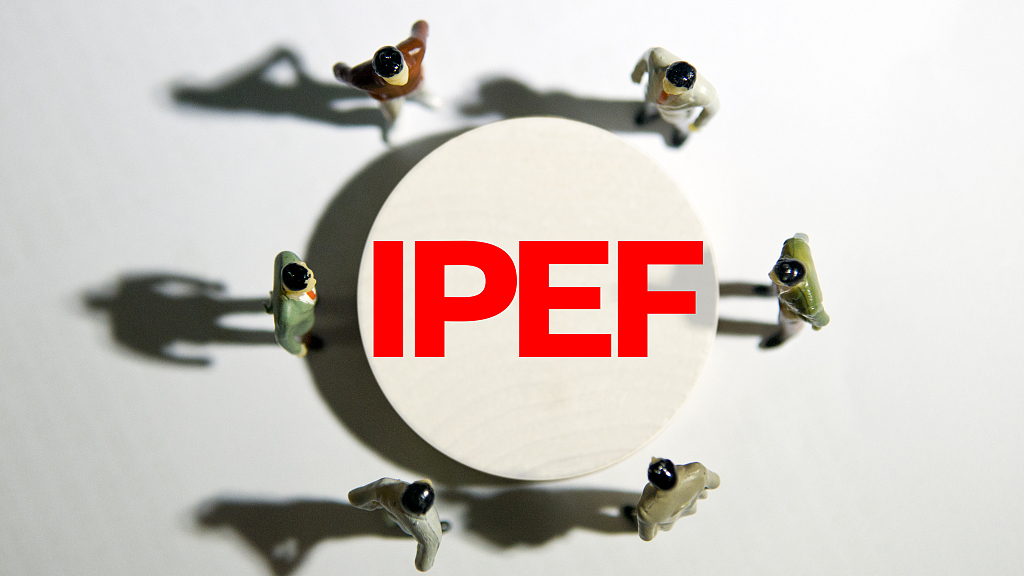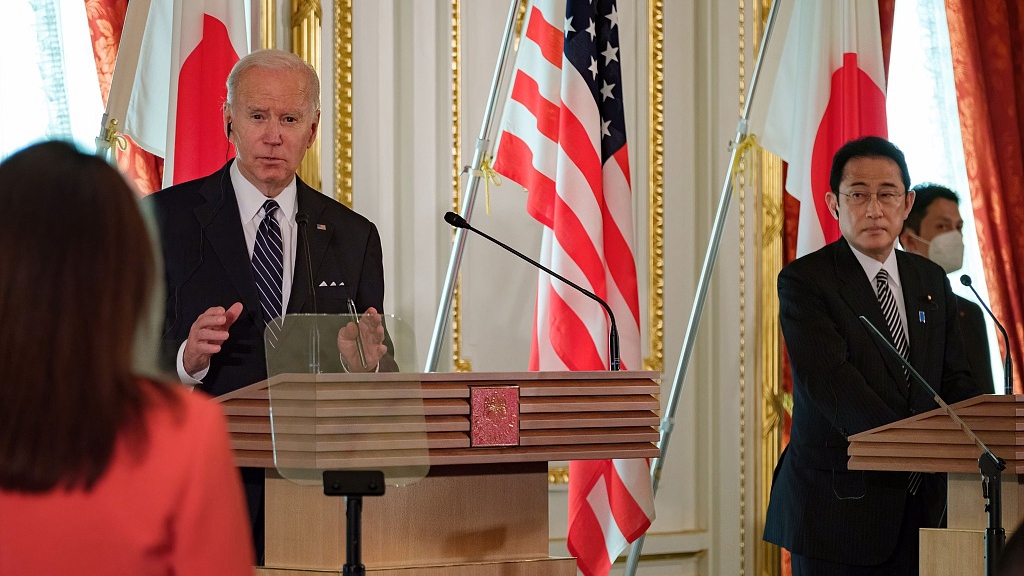
Editor's note: Bobby Naderi is a London-based journalist, guest contributor in print, radio and television, and documentary filmmaker. The article reflects the author's opinions, and not necessarily the views of CGTN.
This is a fantasy of the first order. On May 23, U.S. President Joe Biden launched a new Asia-Pacific trade initiative in Tokyo. Taking it up an escalatory notch, Biden claimed that the Indo-Pacific Economic Framework (IPEF) would offer the 13 countries signing up an alternative to China's thriving and growing commercial presence across the Asia-Pacific.
The signatories of the IPEF include Australia, India, Japan and South Korea. Amid a non-stop deluge of American propaganda, the countries in the region hope that the exclusive clique will deliver them the critical capabilities to prepare their economies for the future following disruptions from the pandemic and the nightmarish war in Ukraine.
More of an aspiration and less of a reality
The signs are everywhere and the proof is in the pudding that the IPEF may prove to be more of an aspiration and less of a reality. The new economic framework will fail to give the signatories the upper hand in future economic warfare scenarios. It is universally obvious that the economic platform suffers from serious shortcomings and unrealistic expectations to blunt China's clout.
The IPEF is a closed club headed to the nearest drain, seeing that it doesn't include China. The exclusive clique doesn't build consensus to offer incentives to prospective partners by lowering tariffs or providing them with greater access to the U.S. market.
Such limitations will not make the platform an attractive alternative to the Trans-Pacific Partnership, which still moved forward after the U.S. bailed. The results will likely be the same when Washington politicians try to make the case that the American model is better than the Chinese one.
The singular truth with a capital "T" is that the U.S. has no intention of accepting the reality of equally and peacefully coexisting with China, even if they have different political systems, ideologies and cultures. There is no political confidence and consistency or alternative to replace China economically and commercially to remake the landscape of Asia-Pacific politics.
Even if there were any truths to these suggestions, the region's strategic environment is extremely complex and doesn't lend itself particularly well to any conventional pact after the global pandemic.
The signatories may want to consult more temperate voices before the pact reaches the point of no return. China, an economic powerhouse, has remade the landscape of Asia-Pacific politics for shared prosperity and development. After its entry into the World Trade Organization in 2001, the country went through massive economic reforms to transform its economy from a low-cost producer to a global leader in advanced technologies.
Along the way, the world's biggest exporter transformed global supply chains, leveraging its success to become the primary trading and development partner for emerging economies across Asia, Africa and Latin America through the Belt and Road Initiative, one of the biggest infrastructure development and investment projects on the planet.

U.S. President Joe Biden and Japanese Prime Minister Fumio Kishida hold a joint press conference at the Akasaka Palace state guest house in Tokyo, Japan, May 23, 2022. /CFP
U.S. President Joe Biden and Japanese Prime Minister Fumio Kishida hold a joint press conference at the Akasaka Palace state guest house in Tokyo, Japan, May 23, 2022. /CFP
On a planet increasingly pushed to the brink, if there are still geopolitical tensions, that's because Washington politicians and their aides refuse to accept the fact that Beijing has emerged as a global power and arrived at a path of sustainable and socially inclusive growth. As a responsible stakeholder, China's integration into the global economy has led to liberalization at home and moderation abroad. It's a lie to claim that this will have geopolitical implications.
Adjusting to Washington's limits
It is worth remembering that despite being an exceptional power, modern China is also the human story of values and intellectual traditions with a flexible worldview. It is the story of the peaceful rise of a nation in modern history. This is an exceptional change not only for China but also for the rest of the world. Washington and its allies need to change their mindsets, as this is not just about China. It's also about their response to this new power.
In this great transformation, engagement and coexistence is the key. Despite different worldviews and ideas, all sides need to move in a reasonable and peaceful direction for a viable and bipolar world. At these great crossroads, they can either commit to a blind view and find themselves at an all-too-dangerous crossroad or maintain a kind of balancing between their different worldviews. These are going to be tough choices, but one thing is absolutely certain. Washington's political elite are not up to the same speed as their Chinese counterparts to deal with these tasks.
In this great period of change and transformation in which everything is connected, a flawed pact like the IPEF will not help the U.S. and its partners to contest and oppose the Chinese people's peaceful aspirations, ideas and hopes for development, transition and growth. It will have messy, inconclusive outcomes and equally disappointing results.
What is in short supply is political commitment to making some hard decisions and having serious engagement and dialogue with the Chinese people and culture, whose strengths and values have enriched and enlivened the world. The IPEF signatories have this opportunity to think for a moment just how far the tables have turned and why they must temper their ambitions since the cost and risk of pushing for more is far too great.
To make the Asia-Pacific a better place, it is imperative that they settle for a more modest role in the region and balance China with their interests. One way to make the region a better place is to adjust to Washington's limits and firm up cooperation with Beijing in diplomacy and trade.
(If you want to contribute and have specific expertise, please contact us at opinions@cgtn.com. Follow @thouse_opinions on Twitter to discover the latest commentaries in the CGTN Opinion Section.)

